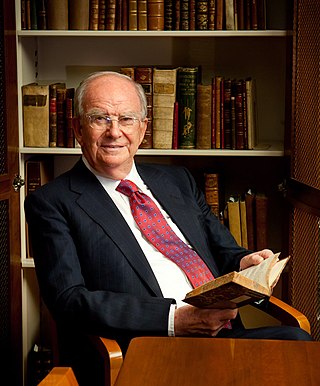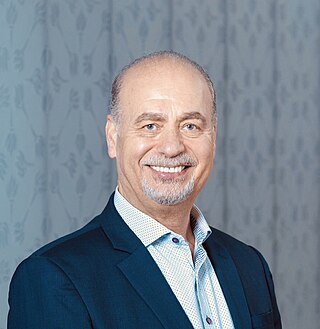Related Research Articles
Ian Fells is Emeritus Professor of Energy Conversion at the University of Newcastle upon Tyne, and former chairman of the "New and Renewable Energy Centre" at Blyth, Northumberland, England.

Sir John Meurig Thomas, also known as JMT, was a Welsh scientist, educator, university administrator, and historian of science primarily known for his work on heterogeneous catalysis, solid-state chemistry, and surface and materials science.

The Institution of Chemical Engineers (IChemE) is a global professional engineering institution with 30,000 members in 114 countries. It was founded in 1922 and awarded a Royal Charter in 1957.

Dudley Brian Spalding was Professor of Heat Transfer and Head of the Computational Fluid Dynamics Unit at Imperial College, London. He was one of the founders of computational fluid dynamics (CFD) and an internationally recognized contributor to the fields of heat transfer, fluid mechanics and combustion. He created the practice of CFD – its application to problems of interest to engineers. Most of today’s commercially available CFD software tools trace their origin to the work done by Spalding's group in the decade spanning the mid-60s and mid-70s. Spalding became a Fellow of the Royal Society and Fellow of the Royal Academy of Engineering.
Richard A. Williams, OBE, FREng, FTSE, FRSE is a British academic and engineer. He is the Principal and Vice-Chancellor of Heriot-Watt University. He took up this position on 1 September 2015. He is also a chemical engineer, Vice President, and a Trustee of the Royal Academy of Engineering.

Claes-Göran Sture Granqvist is a materials physicist and Professor of Solid State Physics at Uppsala University in Sweden. Granqvist is considered a pioneer and expert in photochromic materials and energy-efficient building materials such as glass, paint, and wood.

Saiful Islam is a British chemist and professor of materials modelling at the Department of Materials, University of Oxford. Saiful is a Fellow of the Royal Society of Chemistry (FRSC), and received the Royal Society's Wolfson Research Merit Award and Hughes Medal, and the American Chemical Society Award for Energy Chemistry for his major contributions to the fundamental atomistic understanding of new materials for lithium batteries and perovskite solar cells.

Jyeshtharaj Bhalchandra Joshi is an Indian chemical engineer, nuclear scientist, consultant and professor, widely known for his innovations in nuclear reactor designs and generally regarded as a respected teacher. He is the DAE-Homi Bhabha Chair Professor, Homi Bhabha National Institute, Mumbai, and is the recipient of Shantiswarup Bhatnagar Prize for Engineering Sciences and many other awards and recognitions. He received the third highest civilian honour, the Padma Bhushan, in 2014 for his services to the field of chemical engineering and nuclear science.

Rose Amal is an Australian chemical engineer, currently serving as Scientia Professor and ARC Laureate Fellow in the School of Chemical Engineering at the University of New South Wales, Australia, where she is the director of the Particles and Catalysis Research Group. Previously she was director of the ARC Centre of Excellence for Functional Nanomaterials (2010–2013). From 2012 to 2015 she was named in the Engineers Australia list of Australia's Top 100 Most Influential Engineers. In 2014 she became the first female engineer elected a Fellow of the Australian Academy of Science.

Nidal Hilal DSc PhD EurIng CEng FIChemE FLSW FRSC is is an academic, engineering scientist and scientific adviser. He is a Global Network Professor at New York University and the founding director and principal investigator of NYUAD Water Research Center. He held professorships at the University of Nottingham and Swansea University in the United Kingdom. He is an emeritus professor of engineering at Swansea University and the founding director of the Centre for Water Advanced Technologies and Environmental Research (CWATER).

Ganapati Dadasaheb Yadav is an Indian chemical engineer, inventor and academic, known for his research on nanomaterials, gas absorption with chemical reaction and phase transfer catalysis. He served as the vice chancellor of the Institute of Chemical Technology, Mumbai from 2009 until November 2019. He is currently the Emeritus Professor of Eminence at ICT Mumbai.
Avinash Kumar Agarwal is director of Indian Institute of Technology, Jodhpur. He is an Indian mechanical engineer, tribologist and a professor at the Department of Mechanical Engineering of the Indian Institute of Technology, Kanpur. He is known for his studies on internal combustion engines, Emissions, alternate fuels and CNG engines and is an elected fellow of the American Society of Mechanical Engineering (2013), Society of Automotive Engineers, US (2012), National Academy of Science, Allahabad (2018), Royal Society of Chemistry, UK (2018), International Society for Energy, Environment and Sustainability (2016), and Indian National Academy of Engineering (2015). The Council of Scientific and Industrial Research, the apex agency of the Government of India for scientific research, awarded him the Shanti Swarup Bhatnagar Prize for Science and Technology, one of the highest Indian science awards for his contributions to Engineering Sciences in 2016. Agarwal has been bestowed upon Prestigious J C Bose Fellowship of Science and Engineering Research Board. Government of India. Agarwal is among the top ten highly cited researchers (HCR) of 2018 from India, as per Clarivate Analytics, an arm of Web of Science.
Raffaella Ocone is Professor of Chemical Engineering at Heriot-Watt University and a Fellow of the Royal Academy of Engineering. In 2006 she was awarded the title Cavaliere of the Order of Merit of the Italian Republic and in the 2019 New Year Honours she was appointed OBE.
Rebecca Jane Lunn is a British geologist who is a professor and Head of the Centre for Ground Engineering and Energy Geosciences and Department of Civil and Environmental Engineering at the University of Strathclyde.

Rodney Dewayne Priestley is an American chemical engineer and professor at Princeton University. His research considers the phase transitions of polymers and their application in electronic devices and healthcare. In 2020 he was made the Princeton University Vice Dean of Innovation. He was named dean of The Graduate School effective June 1, 2022.
Peter Noël Rowe FREng FIChemE, ) was a Ramsay professor of chemical engineering at University College London and former president of the Institution of Chemical Engineers.
Paola Lettieri is a British-Italian chemical engineer who is a Professor of Chemical Engineering and Pro-Provost of UCL East at University College London. Her research considers fluidisation and life-cycle assessment. She has developed novel, sustainable fluid-bed processes.
George Jackson,, , is a British professor of chemical physics in the Department of Chemical Engineering at Imperial College London. He is noted for developing molecular models that describe the thermodynamic properties of complex fluids; as one of the developers of statistical associating fluid theory (SAFT); and for his work in molecular systems engineering. His theoretical work has found a wide range of practical applications in industries such as gas extraction and emerging fields like carbon capture and storage.

Sembukuttiarachilage Ravi Pradip SilvaCBE FREng, commonly known as S. Ravi P. Silva or Ravi Silva, is a Sri Lankan-British professor and the Director of the Advanced Technology Institute (ATI) at the University of Surrey. He also heads the Nano-Electronics Centre (NEC), an interdisciplinary research activity. His research interests include nanotechnology, large-area electronics, and Perovskite and organic solar cell. He is also the Founder and the Chief Scientific Officer for Silveray.
Ah-Hyung (Alissa) Park is a chemical engineer and an expert on atmospheric carbon dioxide removal. Originally from South Korea, and educated in Canada and the US, she works in the US as the Ronald and Valerie Sugar Dean of the UCLA Henry Samueli School of Engineering and Applied Science.
References
- 1 2 "List of Fellows".
- ↑ Debrett's People of Today Roland Clift
- ↑ The Times 18 June 1964, page 16 "University News"
- ↑ R. Clift, J. R. Grace and M. E. Weber (1978) Bubbles, Drops and Particles Academic Press
- ↑ J. F. Davidson, R. Clift and D. Harrison (eds) (1985) Fluidization, 2nd ed Academic Press, New York
- ↑ R. Clift and J. P. K. Seville (eds)(1993) Gas Cleaning at High Temperatures Blackie ISBN 0-7514-0178-1
- ↑ "University news". The Times. No. 61198. London. 2 April 1982. p. 16.
- ↑ Centre For Environmental Strategy Professor Roland Clift
- ↑ Browne, Anthony (18 March 2003). ""Recycling drive 'does more harm than good"". The Times. No. 67713. London. p. 16.
- ↑ The Times (online) 28 November 2005 "It's clean, it's cheap – warming to the appeal of nuclear power"
- ↑ The Times (online) 10 June 2007 "Top scientist says biofuels are a scam"
- ↑ "Roland Clift | University of Victoria". uvic.ca. Retrieved 22 June 2020.
- ↑ "Roland Clift | University of British Columbia". ubc.ca. Retrieved 22 June 2020.
- ↑ The Chemical Engineer issue 810 Dec 2008/Jan 2009, page 62
- ↑ "Roland Clift | Chalmers". www.chalmers.se. Retrieved 19 December 2019.
- 1 2 Royal Academy of Engineering Press Release 2 June 2003
- ↑ "CBE". The Times. No. 68585. London. 31 December 2005. p. 52.
- ↑ "No. 57855". The London Gazette (Supplement). 31 December 2005. p. 7.
- ↑ "Hanson Medal".
- ↑ "Davis Medal". IChemE. Retrieved 10 May 2020.